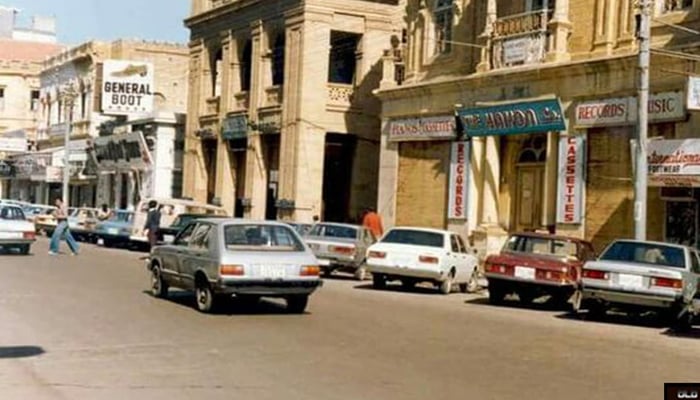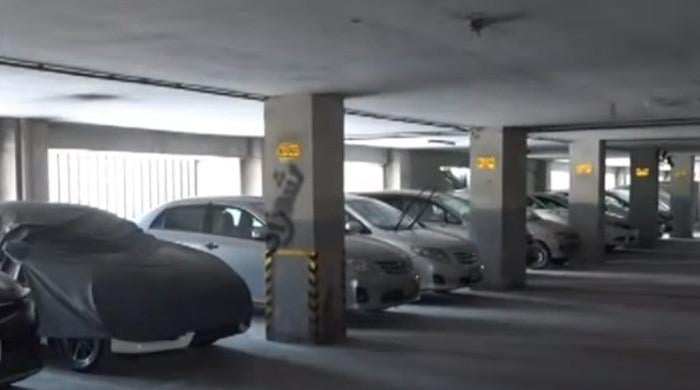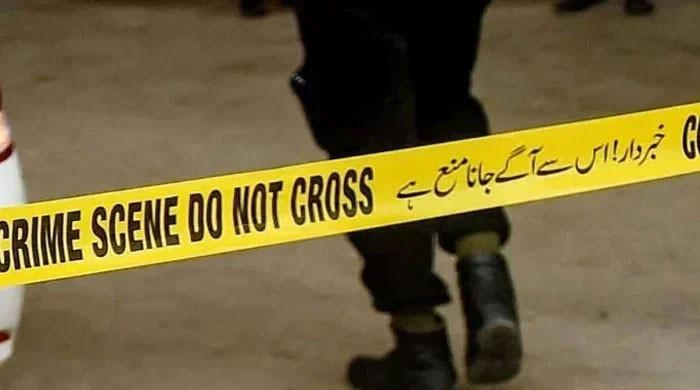Karachi mayoral polls: Administrators and history
According to Encyclopedia Britannica, Karachi had become largest grain-exporting port of British Empire by 1914
June 15, 2023

Jamat-e-Islami (JI) Karachi Emir Hafiz Naeem ur Rehman and Pakistan Peoples Party (PPP) leader Murtaza Wahab are set to go toe-to-toe for the slot of Karachi's mayor in a 367-strong house.
The port city — a premier national industrial and financial centre housing 17.236 million people — was first run by a municipal committee in January 1885 after the first local elections in the city's history were held in November 1884, research shows.
This municipal committee was formed some 15 years before India's first tramway system was constructed in the 19th century. The port was established in 1887, and seven years later, the metropolis was connected by railways to the rest of India in 1878.
In 1910, Sir Charles Mules, an eminent British official, was elected the first President of the Karachi Municipal Committee.
He was succeeded by Ghulam Ali Chagla, whose son Ahmed Ghulam Ali Chagla had gone on to compose Pakistan's National Anthem in 1950, and then by a Parsi business mogul Jamshed Nusserwanji Mehta, who had served the municipality for 20 years.
Widely believed to be the first municipality to collect state revenues in the Sub-Continent, this committee used to levy House Tax on private property owners and ensure its prompt collection too.
According to Encyclopedia Britannica, Karachi had become the largest grain-exporting port of the British Empire by 1914.
After World War I, manufacturing, and service industries were installed, and by 1924, an aerodrome had been built, and Karachi became the main airport of entry to India.
The Encyclopedia Britannica writes: "Karachi rapidly expanded when it was captured in 1839 by the British, who annexed it in 1842.
It then became the British Army headquarters and began to develop from a fishing village into the principal port for the Indus River region.
In 1843, a river-steamer service was introduced between Karachi and Multan. Port facilities were improved from 1854 onward. In 1861, a railway was built from Karachi to Kotri. In 1864, telegraph communications were established with London.
With the opening of the Suez Canal in 1869, Karachi became a full-fledged seaport. By 1873, it possessed a well-managed harbour.
Karachi, with an area of 3,780 square kilometres, has seen 29 executives — both mayors and administrators — heading its local government system since November 1933, when its first elected mayor, Jamshed Nusserwanjee (1886-1952), assumed charge along with 57 subordinate councilors.
According to most estimates, this shanty fishermen's town of yore today contributes 20% to the national gross domestic product (GDP), about 50% of the total revenue, around 47% of direct tax revenues, and almost 45% to the country's value-addition capabilities.
It will have Rs88 billion local bodies grants at its disposal during the fiscal year 2023-24.
In 2022, KMC's budget of over Rs32.21 billion for FY 2022-23 was presented with Rs16.12 million in surplus.
From 1962 to 1979, Karachi was under an administrator-run system.
After Nusserwanjee, still remembered as the "Maker of Modern Karachi, "Parsis, Muslims, Hindus, and Christians all took turns as mayors of Karachi until 1947.
His family firm "Nusserwanji & Co" owned a retail shop at Saddar's Elphinstone Street (now called Zaibunnisa Street), salt, ice, and tile factories, a flour mill, and a large wholesale shop for home provisions and liquor. The famous locality of Jamshed Quarters was developed by Nusserwanjee in 1922.
While Nusserwanjee had donated Rs1,35,000 for the construction of the famous Mama Parsi Girls' High School on Bunder Road (now M.A. Jinnah Road) in Karachi some 105 years ago in 1918, one of his successors, Ardeshir Mama, had bestowed Rs3,00,000 for the same institution.
Soon after the First World War, Ardeshir Mama owned the place where the Palace Hotel and Sheraton Hotel had stood for years.
Messrs Allah Bakhsh Gabol and Abdul Sattar Afghani have both served as Karachi's mayor twice.
Since Nusserwanjee, the following gentlemen have called shots as mayors of Karachi:
- First Hindu mayor Teakum Dass Vadhumull (1934-1935), the first-ever Muslim mayor and a pivotal figure behind Sindh Muslim College
- Qazi Khuda Bukhsh (1935-1936)
- Ardeshir Mama (1936-1937), a noted Hindu tycoon
- Durgadas Advani (1937-1938), a member of the Karachi Muslim League
- Hatim Ali Alvi (1938-1939), renowned novelist Bapsi Sidhwa's father-in-law
- R K Sidhwa (1939-1940), philanthropist and an important character of Gandhi's historic "Non-Cooperation Movement"
- Lalji Malhotra (1940-41), a member of the Bombay Legislative Council and a former Deputy Speaker of the Sindh Assembly
- Hashim Gazdar (1941-42)
- Celebrated Parsi historian Sohrab Katrak (1942-43)
- Shambo Nath Molraaj (1943-44)
- Karachi's imposing business magnate and politician Sir Abdullah Haroon's son Yousaf Abdullah Haroon (1944-1945)
- Karachi's only Catholic mayor and a former President of the "Goa-Portuguese Association", Manuel Misquita (1945-46)
- Wishramdas Dewan Das (1946-47), former ambassador and a provincial minister
- Hakeem Ahsan (1947-48), Quaid-e-Azam's friend, biographer, and a scion of the Khoja-Ismaeli family
- Ghulam Ali Alana (May to July 1948)
- Owner of Karachi's Lea Market, Safoora Goth, Abdullah Gabol Goth, Chutta Khan Goth, Gadap localities and politician Nabeel Gabol's grandfather, Allah Bakhsh Gabol first term (1951-1953)
- Habibullah Paracha, founder of Habibullah Group of Companies that had stakes in coal, marble and chromite mining, textile mills, and sugar (first term-1953 to 1954)
- Sir Abdullah Haroon's second son and former Sindh Governor, Mahmoud A. Haroon (1954-1955)
- Malik Bagh Ali, the man who had announced the construction of a fountain near the Quaid-i-Azam's mausoleum in 1965 (1955-56)
- Siddique Wahab (May to December 1956)
- S.M. Taufiq (June to October 1958)
- Allah Bakhsh Gabol (second term-1961 to 1962)
- Abdul Sattar Afghani (first term 1979 to 1983; second term 1983 to 1987)
- Farooq Sattar (1988 to 1992)
- Naimatullah Khan (2001 to 2005)
- Mustafa Kamal (2005 to 2010)
- Waseem Akhtar (2016 to 2020).
Captain Fahim Zaman, who served as Karachi's administrator between 1998 and 2000, was granted pre-arrest bail by Sindh High Court in 2019 in a case where he was accused of abusing and misbehaving with police.
On August 24, 2016, Waseem Akhtar of the Muttahida Qaumi Movement (MQM) defeated a six-party alliance.
And since August 30, 2020, we have seen administrators running Karachi affairs.
Murtaza Wahab was appointed administrator in August 2021. He served till December 2022.
While Dr Farooq Sattar remains the youngest-ever mayor of Karachi at 28, it was under Abdul Sattar Afghani that Karachi Water and Sewerage Board was established in 1983.
It was also in 1983, Afghani was handcuffed when he was leading a protest.
The elected council was then suspended, and Saeed Ahmed Siddiqui was appointed as administrator of Karachi.
Along with Naimutullah Khan, his JI colleague, Abdul Sattar Afghani, is remembered as the most outstanding mayor of Karachi.
Annals of history reveal that an Englishman, Sir Charles Bartle Frere, developed the Karachi harbour and laid down the railway line between Karachi and Kotri.
An excerpt from the book "Karachi during the British Era," authored by Behram Sohrab Rustomji and Sohrab Katrak, reads: "Roads were constructed, wells were dug and arrangements were made to illuminate roads.
In 1859, the Commission took responsibility of providing potable water to the city, and in 1870, Bunder Road (now M.A. Jinnah Road) was constructed to connect the city to the port. In 1883, the municipality laid 19-mile pipeline from Damloti wells to the city".
On October 25, 2014, a national daily held that during the 19th and 20th centuries, Guajaratis, Parsis, Goan Christians, Anglo Indians, Jews, Arabs, Lebanese, Marathis, Arabs, and Chinese worked tirelessly as workers, business people, developers, administrators, academics, doctors, musicians, soldiers, and sportsmen to give Karachi its diverse culture.
On November 21, 2004, another newspaper stated: "Karachi owes much to its former governor, General Sir Charles Napier (1843-47), and to its commissioner, Sir Bartle Frere (1851-59) who later become governor of Bombay.
"Napier was the man who gauged the potential of Karachi. He ensured that a regular supply of water was conveyed to the city, developed housing and roads, drainage and sanitation facilities, all of which served the city well until Pakistan came into being.
"He installed a powerful lighthouse at Manora Point, and planned to make Karachi a free port by widening the entrance to the harbour, constructing docks and connecting the island of Keamari to Karachi. Napier introduced into Sindh a police system far in advance of any other in India."











